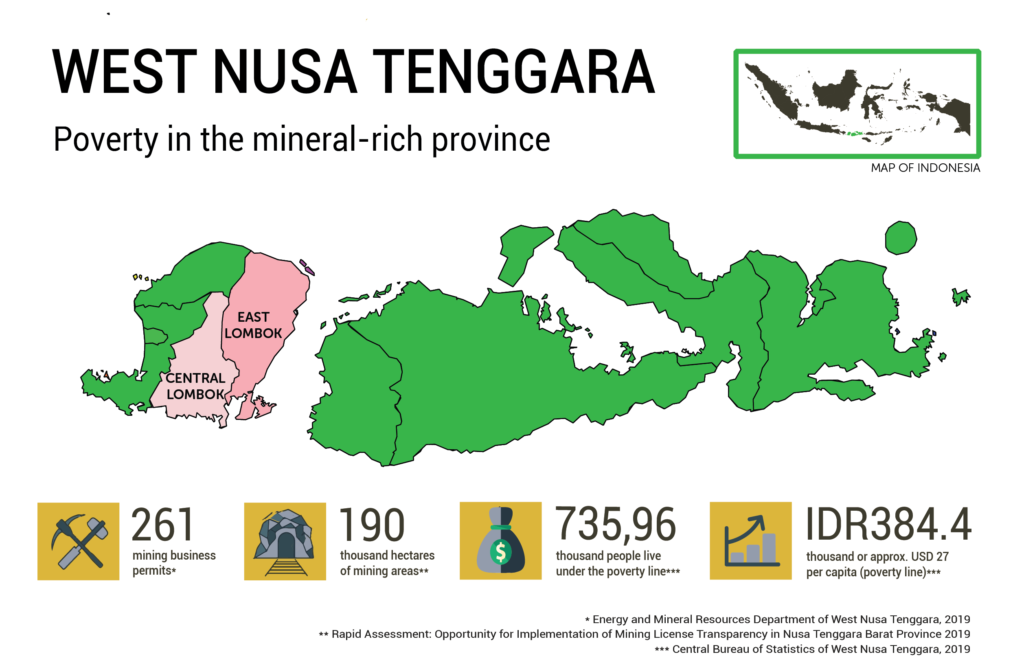The government of West Nusa Tenggara Province issued a Local Government Regulation on Mining Governance in September 2019. In this newly-issued regulation, there is a specific chapter on data and information systems of the mining sector and also provisions that guarantee public participation to monitor mining activities in the province. This is an answer to the problems faced by the people living near mining areas in West Nusa Tenggara Province.

In East Lombok Regency, for example, sand mining activities have significantly affected the income of local fishers. The Indonesia Anti-Mining Mafia Coalition stated that mine tailings have been damaging the marine ecosystem and have been destroying the microorganisms, the source of fish food. The lesser the amount of fish, the lesser the income the fishers get. They now have to spend more money on gasoline to be able to go fishing further to the neighboring province, East Nusa Tenggara.
West Nusa Tenggara Province has an abundant supply of metallic and non-metallic mineral resources, spreading across the cities/regencies. However, mining operations, including iron sand and sea sand mining on multiple coasts in East Lombok and Central Lombok Regencies, have not been able to improve people’s quality of life. The environmental damage resulting from the mining exploitation even puts the citizens living near mining areas in a more disadvantaged position.
The local fishers and other citizens can actually submit a report or complaint to the local officials if they find the mining activities harming their livelihood, like in East Lombok Regency. However, according to Solidarity Society for Transparency (SOMASI NTB), many of the citizens are reluctant to individually deal with mining companies for fear of becoming victims of violence, as allegedly happened to an environmental activist in Central Lombok Regency. Moreover, information on mining licenses and operations is not easy to obtain.
Johan Rahmatullah, a SOMASI NTB researcher, explained that without adequate information, the citizens would not know the obligations of mining companies to the surrounding community. The citizen would also not comprehend the rights and obligations of the companies. As a result, citizens cannot monitor whether the company has fulfilled its obligations or has actually violated the agreement. If the citizens have access to such information, they can provide feedback and report the companies to their government when there is a violation of the contract and if people’s lives are being put in harm with the mining activities.
Responding to the problem, SOMASI NTB Coordinator Dwi Arie Santo proposed to West Nusa Tenggara provincial government to include provisions on information disclosure and public participation in the Local Government Regulation on Mining Governance. He delivered the recommendation in a public consultation event on the draft regulation in May 2019. Furthermore, he said, “SOMASI NTB continues having intensive and informal communication with the drafting team and related agencies until the regulation passed on 11 September 2019.”
Due to SOMASI NTB’s success, there is now explicit provisions in the Provincial Regulation Number 9 of 2019 which require the provincial government to publish their mining data and information. The government must also publish the names of the regional apparatus organizations owning the data. This will help the citizens to obtain information that can be used as their basis to monitor mining operations. The regional apparatus organizations can no longer refuse the mining information requests and say that they don’t have the data.
Moreover, several provisions on citizen participation also guarantee the rights of citizens in overseeing the mining operations. This provision is important to allow citizens to be able to hold the mining companies accountable if they damage the environment and threaten citizens’ lives. The local fisher, for example, can now report to the government if sand mining activities in their area cause a decreasing supply of fish.
Though SOMASI NTB’s efforts have provided a significant change in encouraging improvements in mining governance in the Province, their work is not finished yet. According to Meliana Lumbantoruan, Program Manager of Publish What You Pay (PWYP) Indonesia, there are at least two essential points that also need to be accommodated in the Mining Governance regulation.
The first one is the protection for the citizens who report irregularities in mining activities from criminalization and persecution, she said. The government also needs to specify the requirements that citizens must meet before they submit a complaint. “We don’t want the government to ignore the submitted complaints and reports because the citizens don’t have enough evidence nor able to meet the administrative requirements for submitting feedback,” she added.
*Have a look at other stories about open contracting and mining licenses in West Nusa Tenggara Province on the links below: